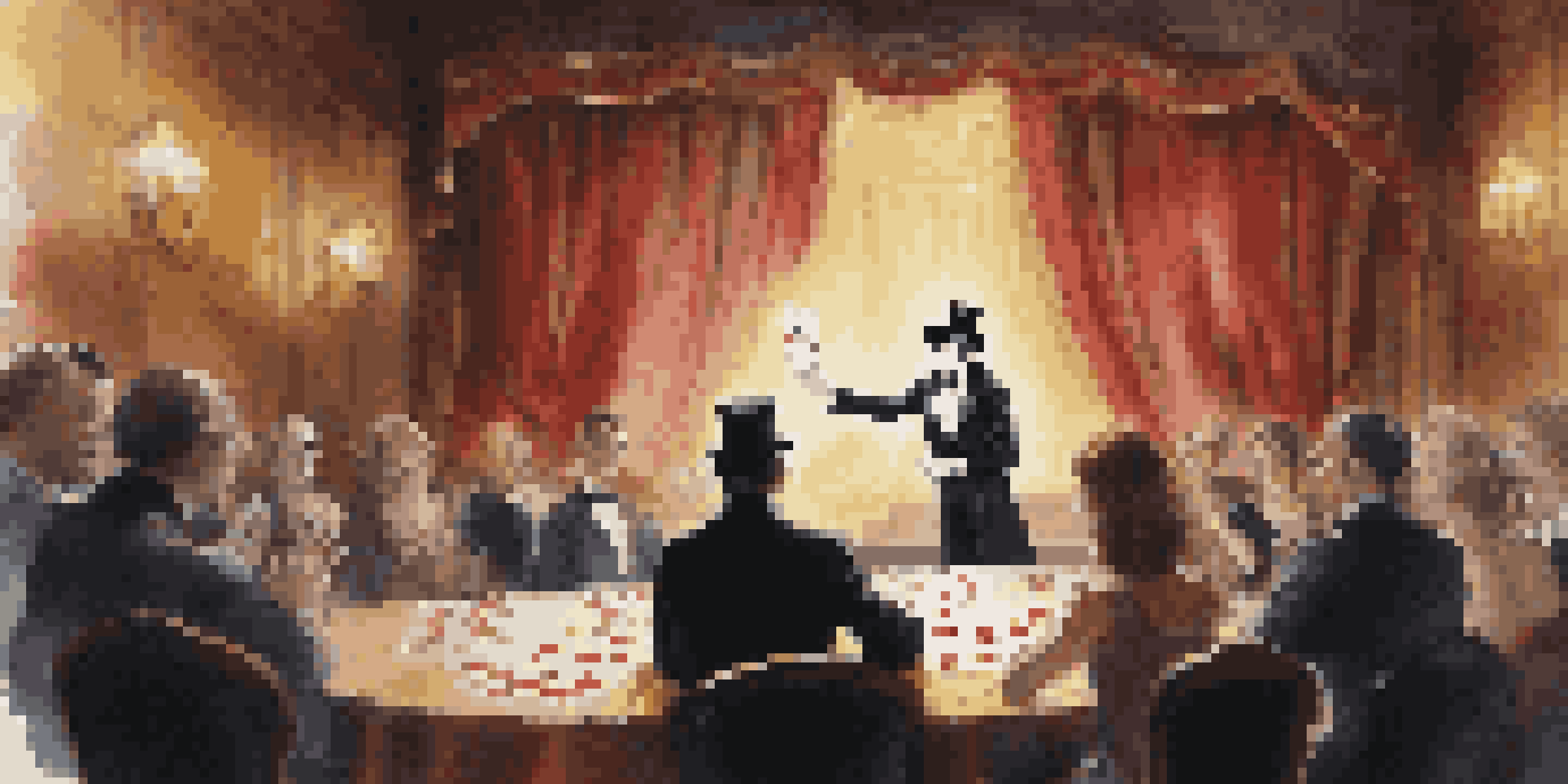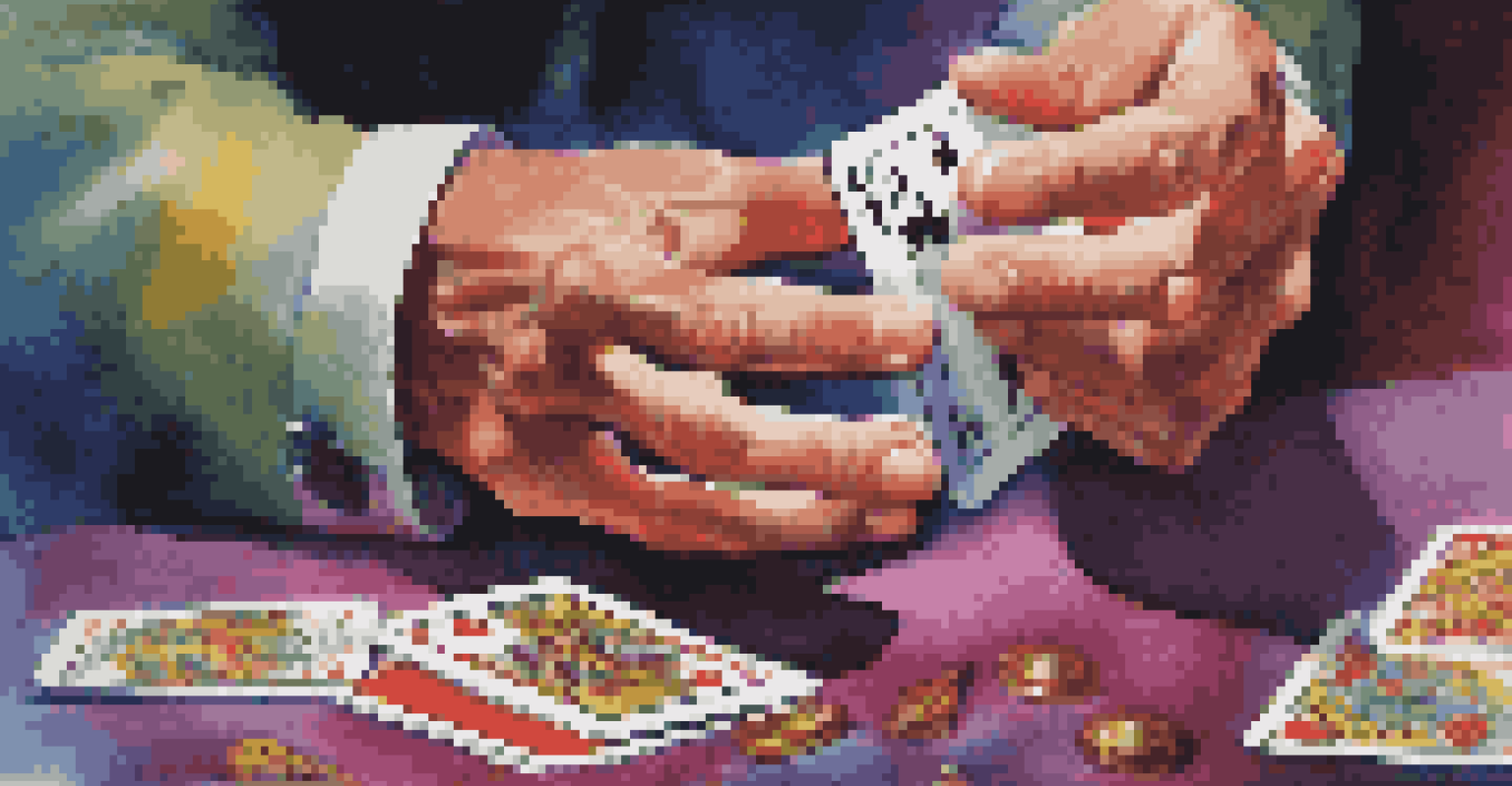The Language of Magic: Understanding Terminology and Jargon

What is Magical Terminology and Why It Matters
Magical terminology refers to the specific words and phrases that are commonly used in the world of magic. Understanding this language is essential for anyone looking to delve deeper into magical practices, whether as a practitioner or an enthusiast. Just like any specialized field, magic has its own lexicon that can seem daunting at first.
Magic is not about tricks, but about the experience and the connection it creates with the audience.
This specialized vocabulary helps to create a shared understanding among practitioners, making communication more effective. When you encounter terms like 'abracadabra' or 'conjure,' it’s not just about the words themselves but the concepts and practices they represent. Familiarity with this language can enhance your experience, making it richer and more immersive.
Moreover, grasping magical terminology can also help demystify the art itself. By understanding what these terms mean, you can appreciate the underlying principles and techniques that make magic so enchanting. In essence, it opens the door to a deeper connection with the craft.
Common Terms Every Aspiring Magician Should Know
There are several key terms that anyone interested in magic should familiarize themselves with. For instance, 'illusion' refers to a trick that deceives the audience into believing something impossible is happening. Then there's 'sleight of hand,' a technique used to manipulate objects discreetly, often seen in card tricks.

Another important term is 'patter,' which refers to the dialogue or commentary a magician uses during a performance. Good patter can engage the audience, adding an extra layer of entertainment to the visual tricks. Understanding these terms not only enhances your knowledge but also boosts your confidence when discussing or performing magic.
Understanding Magic's Unique Language
Magical terminology creates a shared understanding among practitioners, enhancing communication and deepening the connection to the craft.
Lastly, the term 'ritual' is significant in many magical traditions, often involving a series of actions performed according to a prescribed order. This concept ties the performance of magic to broader cultural practices, showing that magic is not just about tricks but also about meaning and intention.
Exploring Jargon: The Specialized Language of Magicians
Jargon is the unique language that develops within a specific community, and the world of magic is no exception. For example, terms like 'gimmick' refer to hidden devices or props that assist in performing a trick. Knowing jargon helps magicians communicate effectively and efficiently, saving time and avoiding misunderstandings.
Words are, of course, the most powerful drug used by mankind.
Moreover, jargon can create a sense of belonging within the magical community. When you understand the lingo, you’re more likely to feel like part of the group, whether in casual conversations or formal magic circles. It’s almost like a secret handshake, a way to connect with fellow enthusiasts on a deeper level.
However, it’s crucial to balance jargon with accessibility. While it can be tempting to use specialized terms to impress others, clarity should always come first. By explaining jargon when necessary, you can make the world of magic more inviting for newcomers.
The Role of Context in Understanding Magical Language
Context plays a significant role in understanding magical terminology and jargon. A term can have different meanings depending on the situation in which it is used. For instance, 'deck' can refer to a pack of cards in a card trick or a stage setup in a performance environment.
When learning magical language, consider the context in which you encounter these terms. Is it during a performance, a tutorial, or a discussion among enthusiasts? Each setting may provide clues that help clarify the meaning behind the words. This approach not only aids comprehension but also enriches your magical experience.
Key Terms for Aspiring Magicians
Familiarity with essential terms like 'illusion' and 'sleight of hand' boosts confidence and enriches your magical knowledge.
Additionally, understanding context can enhance your appreciation for the artistry involved in magic. Recognizing how terms shift in meaning based on their usage can deepen your insight into the magician's craft, making every performance a more profound experience.
Breaking Down Popular Magical Terms: A Closer Look
Many magical terms have fascinating origins and meanings. For example, 'abracadabra' is believed to have roots in Aramaic, meaning 'I create as I speak,' which perfectly encapsulates the essence of magic. This simple phrase carries a deeper significance that connects practitioners to the history of their craft.
Another term worth exploring is 'levitation,' which describes the act of making an object or person appear to float in the air. This term not only refers to the trick itself but also evokes feelings of wonder and disbelief. The beauty of magic lies in its ability to challenge our perceptions of reality.
By breaking down these terms, you can appreciate the layers of meaning they hold. Each word in the magical lexicon is a thread connecting practitioners to centuries of tradition, creativity, and wonder. This exploration can inspire you to delve deeper into your magical journey.
The Importance of Learning and Using Magical Language
Learning the language of magic is essential for anyone serious about exploring this enchanting world. It not only allows you to understand and appreciate the art but also equips you with the tools to communicate effectively with other practitioners. Engaging with the language can elevate your magical practice and performances.
Using magical language correctly can also enhance your credibility as a magician. When you can confidently discuss techniques, tricks, and concepts, you demonstrate a level of expertise that can impress audiences and fellow magicians alike. It’s a way of showing that you take the craft seriously.
Making Magic Accessible to All
Simplifying magical terminology invites newcomers into the community, fostering understanding and a shared appreciation for the art.
Furthermore, mastering this language opens up opportunities for collaboration and mentorship within the magical community. You’ll find it easier to connect with others, share ideas, and learn from experienced magicians. In essence, the language of magic is a bridge that connects you to a vibrant world of creativity and inspiration.
Bridging the Gap: Making Magic Accessible for All
While understanding magical terminology and jargon is vital for practitioners, making this language accessible is equally important. Newcomers to magic can often feel overwhelmed by the complexity of terms and concepts. By simplifying explanations and providing context, we can invite more people into the magical community.
Creating resources that break down terminology in a clear and engaging way can help demystify the art of magic. Think of it as translating a foreign language; the goal is to foster understanding and appreciation. Workshops, blogs, and tutorials that focus on terminology can serve as valuable tools for aspiring magicians.

Ultimately, the magic community thrives when knowledge is shared. By bridging the gap between seasoned practitioners and newcomers, we ensure that the enchantment of magic continues to inspire future generations. Together, we can create an inclusive environment where everyone feels welcome to explore and engage with the art of magic.